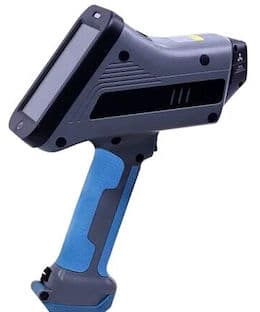
-----
Stainless steel on an outdoor grill
I am planning to purchase a outdoor gas grill. A recent Consumer Reports magazine suggested taking along a magnet to "test" the stainless. A better stainless, i.e., less subject to corrosion would be non-magnetic. Is this a reasonable test?
Thomas Cherekhome owner - Waukesha,Wisconsin
2005
|
|
The 300 series stainless steels are non-magnetic. They have good corrosion resistance, and will last almost forever, except for the heated parts, which will embrittle and fall apart after a few years. I'd rather have a grill with heavy cast aluminum case and porcelain enameled grills and burners.  Jeffrey Holmes, CEF Spartanburg, South Carolina A stainless steel that is non-magnetic is usually higher in levels of chromium and other metals that are not ferrous, thus non-magnetic. Some stainless steels are magnetic and have good rust resistance qualities, there are a lot of qualifiers and different tests for checking the grade of stainless steels (acids, Rockwell hardness, spray test, etc). Blacksmith - Shiloh, North Carolina Lots of alloys, with lots of variation in corrosion resistance, are non-magnetic; therefore your magnet test would be of limited use (I would suspect). Compton, California, USA Generally, yes. The martensitic, precipitation hardening, and ferritic stainless steels are the ones that are magnetic. They have less corrosion resistance than the standard 18-8 (chromium and nickel content, in %) austenitic stainless steels, which are not magnetic in their annealed condition. The austenitic grades CAN become magnetic when they are heavily cold worked- items like sheet and wire. They'll still have better corrosion resistance than the standard martensitic, precipitation hardening, and ferritic grades, but that's why I had to couch the answer with "generally" instead of a flat out "yes".  Lee Gearhart metallurgist - E. Aurora, New York |
2005
![]() Thanks for all the responses. It is really great to have people who "know" the science behind a product share their knowledge.
Thanks for all the responses. It is really great to have people who "know" the science behind a product share their knowledge.
Since I wrote my first question I've seen several stainless grills after extended use. All showed signs of stains from heating. I've decided to go with a cast iron or aluminum grill with a brass or cast iron burner.
Thanks for all your help. Tom
- Waukesha,Wisconsin
Q. How can I easily check that my supplier is producing goods from 304 Stainless and not from other grades of stainless steel with less corrosion resistance
Rik Saunders- Perth. WA, Australia
February 15, 2010
A. Hi, Rik. When you say "easily" do you really mean "easily and CHEAPLY"? Because if cost is not an object, a handheld alloy sorter / scrap sorter ⇦ on eBay or Amazon [affil link] X-ray Fluorescence unit will identify the exact alloy very reliably and almost instantly. But these run about $35,000-$45,000.
If you need a cheap and simple test, but less reliable, simply use a magnet. 304 stainless steel and all the 3xx stainless steels are essentially non-magnetic (though they may become slightly magnetic, proportional to how much cold working they have received, and how little annealing) whereas the lower grade 4xx stainless steel is magnetic.
Regards,

Ted Mooney, P.E.
Striving to live Aloha
finishing.com - Pine Beach, New Jersey
Ted is available for instant help
or longer-term assistance.
February 2010
Multiple threads merged: please forgive chronology errors and repetition 🙂
Protect stainless steel grill near the ocean
Q. Sir, I purchased a stainless steel Gas Grill for my outdoor kitchen. Living on the Atlantic ocean, I was told that I should SPRAY the grill with some sort of protective finisher. To protect against rust and corrosion, what do you suggest that I use to spray on the Grill, if anything. Incidentally, I did purchase a custom cover made for the Grill. I so value your advise; thank you for the response.
Dr. Betty Green- Palm Coast, Florida, USA
July 30, 2012
A. Hi again.
Everbrite [a finishing.com supporting advertiser] offers a simple one-part clear coat by the same name. I wouldn't expect it to last forever, but if you applied it at the end of the B-B-Q season each year I think it would make a big difference. Good luck.
Regards,

Ted Mooney, P.E.
Striving to live Aloha
finishing.com - Pine Beach, New Jersey
Ted is available for instant help
or longer-term assistance.
August 29, 2012
Outdoor kitchen and grill in 304 vs. 430?
March 24, 2015Q. Hi all.. Kristoffer here.
Need your expert opinion on a product we are planning to sell.
We have been offered some outdoor kitchens and outdoor kitchens combined with a nice charcoal bbq.
All is made of stainless steel - and we can choose to have it made from either 430 or 304. I have read that 304 are more resilient to corrosion but 430 should be better at withstanding the heat from the grill. Is this correctly understood, or are even 304 a better material for a bbq?
The kitchens are made from 1,25mm thick steel (either 304 or 430). From producers we have been told that expected "life" of the kitchen if made in 430 should be around 15-20 years. How does this sound to an expert? :-)
If we choose to produce in 304 rather than 430 - any suggestion to how much longer we could expect the steel to withstand corrosion. It's outdoor kitchens, so we expect them to be outside without cover year around (in all kinds of weather).
Our difference in buying price between 430 and 304 are around 50 USD per product (around 10% of total price) In your opinion (10 % is not much) is it worth it to produce in 304 instead of 430?
Thank you so much for any help in this.
Best regards
Buyer - Trelleborg, Scania, Sweden
A. Hi Kristoffer,
If you feel that 430 ss is better for your product quality, go ahead and select this material. We will help you to electropolish it and make 430 ss protected against corrosion as if it is made from 316 or 304 ss.

Anna Berkovich
Russamer Lab - Pittsburgh, Pennsylvania
(ed. update July, 2025: sorry, Anna has retired)
March 25, 2015
March 26, 2015
Kristoffer,
I generally don't get too much into alloy selection, most of my customers already have that worked out, but let's see what we can do.
Some generalities I can give you. Austenitic (300 series) stainless grades are always more corrosion resistant than ferritic and martensitic (400 series). This is due to the nickel that is used in 300 grades but to a much lesser extent or not at all in the 400 grades. The trade off is that the 400 grades tend to have better hardness properties.
In an environment that isn't terribly corrosive, it probably doesn't matter all that much. If you are near a marine coastline though, you can expect corrosion, the only question is how quickly. 304 will hold up longer than 430. 316 even longer.
As far as heat resistance goes, I don't know offhand how the two compare. In general a high enough heat will discolor stainless, though from just a cooking grill the main issue will probably be the smoke and soot. A quick google dive got me things like:
"[430] is highly corrosion and heat resistant but somewhat less than Types 301, 302 and 304."
"Type 430 decorative, e.g., for automotive trim; ferritic. Good formability, but with reduced temperature and corrosion resistance."
"Stainless steel grade 430 is capable of resisting oxidation up to 870 °C (1598 °F) in intermittent usage, and up to 815 °C (1499 °F) in continuous usage."
"Stainless steel grade [430] is currently the most used ferritic stainless steel grade in the world. ... the grade is used in wide range of applications, mostly indoors."

Ray Kremer
Stellar Solutions, Inc.
McHenry, Illinois

Stainless Steel as Infrared Plate in an Outdoor Grill
April 3, 2015Q. Hello everyone. My apologies if this question was asked previously. I did a search and it did not come up.
I have an older outdoor grill that should last me a few more years. I wanted to use a stainless steel plate to create and infrared plate under the cooking grates. For those unfamiliar, an infrared plate in a grill is basically a thin piece of stainless steel that has tiny holes all along the surface of the sheet. It is inserted on top of the burner and under the cooking grate. It eliminates flare ups and supposedly creates an intense radiant heat around 800 °F.
I was thinking of purchasing a stainless steel sheet and drilling tiny holes along its surface to accomplish this effect in my grill.
1) What gauge of stainless steel would be best for this application? I was thinking 16 ga.
2) All the of the places I've searched list stainless steel sheets with a #2 finish or #4 finish. What is the difference? Are both food safe? Which would be better in this application?
3) Will the sheet warp or rust quicker under that kind of heat?
Any help would be appreciated. I'd like to get this done before May and in the safest and most durable way possible.
Thanks in advance.
- New Brunswick, New Jersey
Q, A, or Comment on THIS thread -or- Start a NEW Thread
